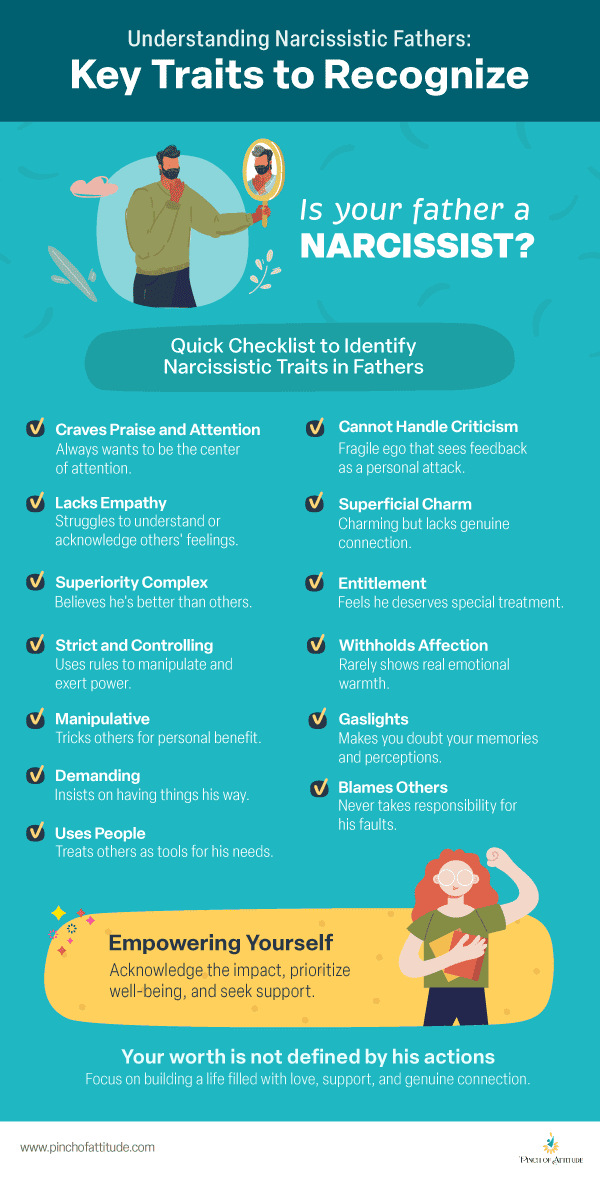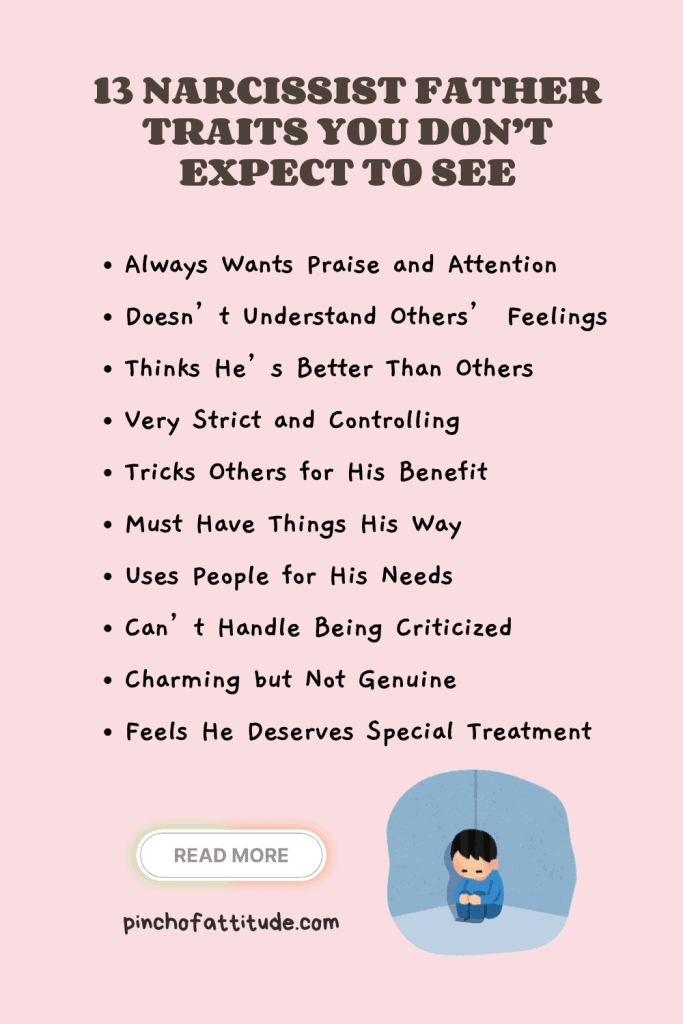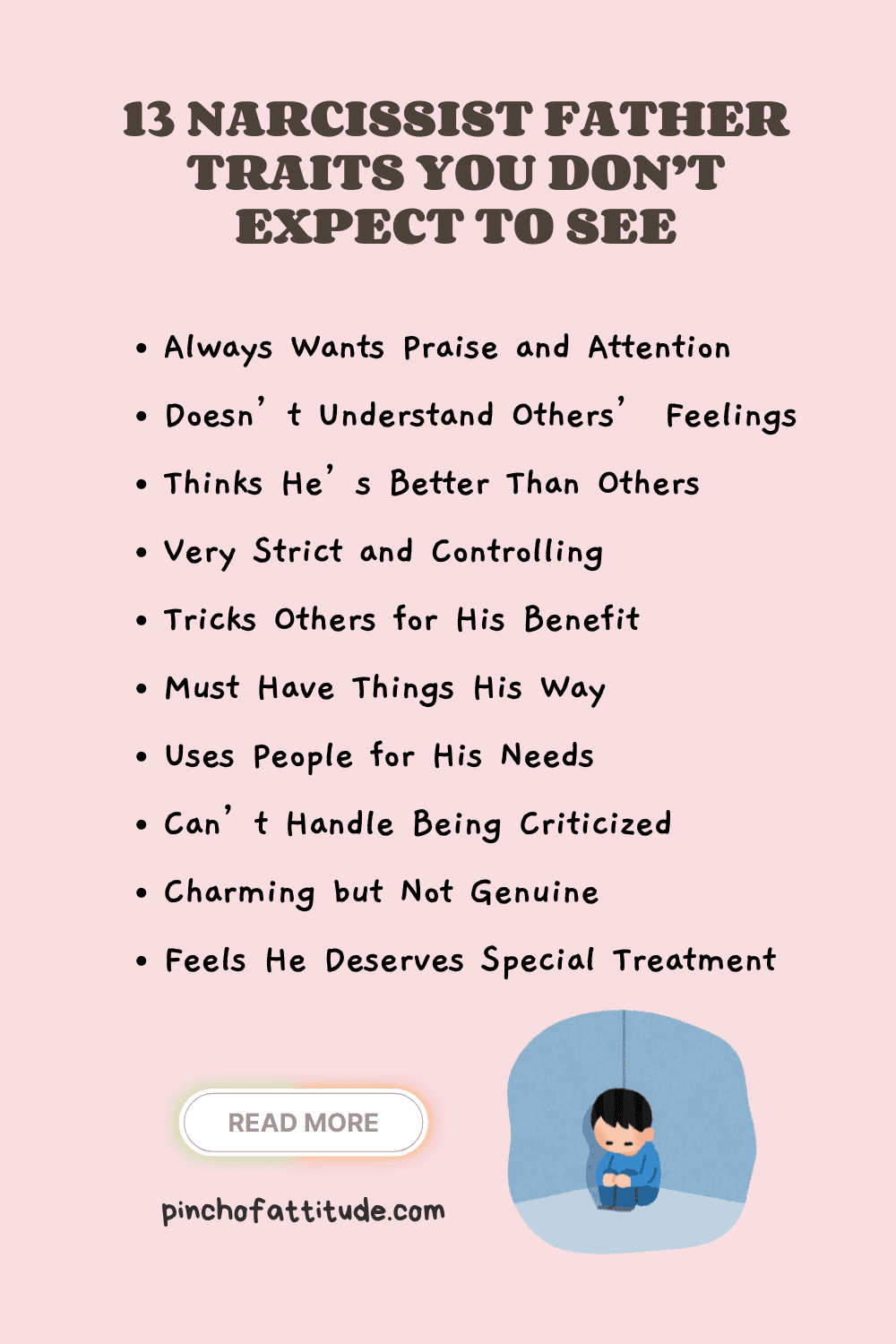Dads get a bad rap sometimes, right? Forgetful on birthdays, embarrassing in public, terrible at parallel parking. It’s all part of the charming package.
But sometimes, under the surface of those groan-worthy quirks, there can be something deeper at play. We’re talking about the not-so-typical narcissist father traits.
The charm that hides manipulation, grandiosity that masks insecurity, and advice that somehow always benefits him.
Often, the nastiest narcs hide their toxins behind a mask of “normal.”
And if you’re starting to think your dad fits more than a few of these not-so-charming descriptions, check out the 13 red flags that will have you evaluating your relationship.
- Growing up with a narcissistic father may make you doubt your worth, but remember, your emotions are real and deserve validation.
- Prioritize your mental health by setting healthy boundaries or don’t feel guilty about cutting all ties if necessary.
- You have the power to build a fulfilling life independently. Connect with trusted friends and family or support groups to share your struggles.
Table of Contents
13 Narcissist Father Traits You Should Look Out For

If you ever find yourself questioning if your own dad’s narcissistic traits fall under the “narcissistic dad” umbrella, you’re not alone.
Here’s a quick checklist of narcissistic father characteristics to help you understand the dynamics at play.
1. Always Wants Praise and Attention
Fathers with narcissistic personality disorder like being the center of attention. Some would even say they are masters of attention-hoarding.
They crave praise and validation like a starving man craves a steak, leaving their children feeling overlooked and emotionally drained.
Growing up with a narcissistic dad, my cousins witnessed the first red flag early on, his insatiable need for praise and attention.
My cousin, the eldest, learned to navigate this dance, occasionally offering praise like crumbs to keep the peace.
But the deeper scar was the constant feeling of being overshadowed, her achievements never shining as brightly as they deserved.

2. Doesn’t Understand Others’ Feelings
Dads with narcissistic personalities struggle with a curious blind spot: the inability to truly understand or even acknowledge the feelings of others.
Think back to a time you were excited about something. Maybe a school play, a first date, a big game.
Did your dad seem genuinely interested? Did he ask questions, validate your emotions, offer support, or even just listen without interrupting his own experiences?
Or did he brush it off, minimize your feelings, or worse, make it about himself?
This lack of empathy isn’t just hurtful, it’s isolating. Growing up with a father who can’t “get” your emotions can leave you feeling unseen, unheard, and emotionally stunted.
But remember, just because your father is self-centered doesn’t mean your feelings are invalid. They’re real, they’re important, and they deserve to be validated.
3. Thinks He’s Better Than Others
Have you ever felt like you can never outdo your dad or you can never measure up to his unrealistic standards?
A narcissistic father may think he occupies a golden pedestal. He may not openly declare himself king of the castle, but his every action whispers, “I’m better.”
Sons of narcissistic fathers may experience this constant sting of inadequacy.
From comparing his achievements to yours to dismissing your interests, he weaves a narrative of his superiority.
Whenever your narcissistic dad comments on your achievements, remember that you don’t need his validation to shine.
Celebrate your victories, big and small, and know that your journey is yours alone.
4. Very Strict and Controlling
Narcissistic dads believe structure and discipline pave the path to success, pushing their children towards academic or athletic glory.
Every choice, from hobbies to romantic relationships, is carefully vetted and often, overruled.
It’s worth noting that these narcissistic father traits are not synonymous with plain strictness. Discerning the heart behind the hand is crucial.
Strict dads, while demanding, often have their children’s best interests at heart. They want them to excel, to be prepared, to build strong foundations for their future.
It’s about guiding, not controlling.
Narcissistic fathers, on the other hand, twist strictness into a tool. They use rules and expectations to manipulate, exert power, to keep their children orbiting their own needs.
It’s not about your success, it’s about theirs.

5. Tricks Others for His Benefit

A narcissist will often dazzle you with illusions of grandeur while pulling strings behind the curtain.
Narcissistic fathers may exhibit exaggerated achievements, play the victim, and shift blame to anyone but themselves.
In other words, they are masters of manipulation who trick others for their benefit.
Many children of narcissists experience similar dynamics. I saw this kind of toxic relationship first-hand.
My cousins’ dad, like the magician, held them captive in a performance of self-aggrandizement.
As a result, they felt like they were constantly walking on eggshells, doubting their perceptions and questioning their dad’s motives.
6. Must Have Things His Way
Another one of the common traits of a narcissistic father is an insatiable need for control.
Discussions become one-sided monologues, decisions are unilateral pronouncements, and even minor preferences morph into battles of wills.
Living under this regime where you always anticipate the next power play can be stifling.
Your opinions, desires, and even basic needs are dismissed as unimportant. It’s like living in a one-man dictatorship, where compromise is a foreign word.
In the case of my cousins, their narcissistic dad’s unwavering need to dictate every aspect of their relationship eventually pushed them away.
And if they can cut contact, you can, too.
7. Uses People for His Needs
This was my uncle. He wasn’t just charming, he was a human magnet.
People were drawn to his wit, his charisma, and his promises of success. But as we learned the hard way, it was all a mirage.
My cousin’s dad used people, friends, and even his children, like shiny tools. They were useful only until they dulled or stopped reflecting his glory.
That’s narcissism at its core: treating people as tools, discarding them when they’re no longer useful.
Sadly, my older cousin learned early on that to win his approval, she had to become an extension of him: ambitious, ruthless, and devoid of empathy.
But their need to use others is a weakness, not a strength. They’re hollow at their core, always seeking validation from the outside world.
8. Can’t Handle Being Criticized
Picture a mirror that shatters at the slightest touch. That’s the fragile self-esteem of many narcissistic individuals, including, I’ve learned, some fathers.
For them, any disagreement, even a constructive suggestion, morphs into a personal attack on their inflated sense of self-importance.
True confidence, however, doesn’t crumble at the first sign of disagreement. It embraces growth, learning, and genuine connection.

9. Charming but Not Genuine
A father with narcissistic tendencies is often charming. However, his charm rarely translates into true connection.
For example, he may shower everyone with praise at family gatherings but belittle them behind closed doors.
There’s no denying that my cousin’s dad was charismatic.
He could weave tales of grandeur, crack jokes that left everyone in stitches, and turn an ordinary evening into a captivating performance.
But beneath the glitter and wit, something was always missing: genuineness.
This discrepancy between charm and genuineness can be deeply confusing. But remember, you deserve love and connections that are real, not fleeting illusions.
10. Feels He Deserves Special Treatment
A narcissistic person believes they deserve VIP treatment everywhere they go. Rules? Lines? These are mere suggestions to them.
They desperately cling to a manufactured image of grandeur, expecting the world to bow at their every whim.
It’s like watching a child demand a crown made of paper, mistaking it for true royalty.
My uncle used to skip family gatherings unless they were “worthy” of his presence. If he did show up, he expected Michelin-star meals while barely acknowledging the effort.
But here’s what I realized. Their need for special treatment masks a deep insecurity, a fragile ego constantly seeking validation through perceived privilege.
11. Rarely Shows Real Affection
Forget warm hugs and heartfelt conversations. Narcissistic fathers rarely dish out real affection.
Their children may crave a hug that feels real, a word of encouragement that isn’t laced with strings, a simple “I love you” that isn’t followed by demands. But it rarely comes.
A narcissistic father’s affection is like a firework. It’s flashy and loud, but it’s never real and can leave you cold and empty.

12. Makes You Doubt Your Memories
Does your dad strategically distort events, deny his actions, or insist your recollections are flawed?
A narcissistic father uses gaslighting as a weapon to manipulate those around him.
This results in a pervasive sense of self-doubt, where you never feel secure in your understanding of the abuse that’s happening.
Don’t get sucked into his warped world. Trust your gut, talk to trusted people, and remember: your memories are yours.
You’re not crazy, you’re just navigating a messed-up situation. Step into your truth, own it, and leave his gaslighting circus behind.
13. Blames Others for His Faults

People with narcissistic personality disorder love a good scapegoat. Think master deflection: a dad who blames everyone from the weather to the dog for his mistakes.
Missed promotion? Not their fault, it’s the incompetent colleagues. Burnt dinner? Not the overcooked steak, it’s your “picky palate.”
This constant deflection can leave you feeling responsible for his problems but don’t fall for it. His mistakes are his own, and you deserve to be free from his scapegoating.
Build your path, one paved with accountability and self-awareness. It’s a healthier, happier road than the one he’s on.
What Can You Do to Cope With the Impacts of Your Narcissistic Father?
Growing up with a parent with narcissistic tendencies can be a long and complex journey.
Sons and daughters of narcissistic fathers may experience emotional confusion, self-doubt, and difficulties setting boundaries.
But amidst the challenge, there is hope for healing and building healthy relationships.
Here are some strategies you can use to manage the relationship and cope with the impacts:
- Acknowledge it. Recognizing the emotional and psychological effects of your father’s behavior is crucial for healing. For example, when my aunt acknowledged his narcissistic partner’s abuse and decided to raise her children alone, it shielded them from the negative influence of their narcissistic father.
- Prioritize your well-being. This might involve setting healthy boundaries, limiting contact, or even cutting contact with your narcissistic father if necessary. Remember, your emotional and mental health is important.
- Seek support. Connecting with trusted friends, family members, therapists, or support groups can provide invaluable validation and guidance. Sharing your experiences and learning from others who have navigated similar situations can empower you and equip you with coping strategies.
Is there hope for a healthy relationship?
While complete healing and reconciliation may not always be possible, focusing on your well-being and building healthy relationships with others can create a fulfilling life independent of your father’s influence.
Remember, your worth is not defined by his actions, and you have the power to build a life filled with love, support, and genuine connection.
Related Posts:
- 17 Narcissistic Father Abuse Tactics and Its Ugly Effects on You
- 15 Damaging Signs of a Covert Narcissist Father You Must Know
- 30 Things Narcissistic Fathers Say: How to Verbally Disarm Them
- How to Deal With a Narcissistic Father? It’s Not About Him!
- How to Defeat a Narcissist Father: 9 Psychological Tips You Can Use Today
Frequently Asked Questions
How does a narcissistic father behave?
A narcissistic father has the hallmarks of narcissistic behavior. He exhibits self-centeredness, lacks empathy, seeks constant admiration, manipulates others, and displays controlling and entitled behavior.
How does having a narcissistic father affect your mental health?
Having a narcissistic father can impact mental health and cause anxiety, depression, low self-esteem, and difficulty forming healthy relationships.
Does having a narcissistic father mean you will experience narcissistic abuse?
Having a narcissistic father doesn’t guarantee narcissistic abuse, but it raises the risk. The potential for manipulation, gaslighting, and narcissistic rage is higher in such relationships.
What are the warning signs of a narcissistic parent?
The key warning signs of a narcissistic father include a constant need for praise, lack of empathy, manipulation, control issues, and a sense of entitlement.
How can children of narcissistic fathers develop healthy boundaries?
Children of narcissistic fathers can develop healthy boundaries by recognizing patterns, practicing self-care, seeking therapy, and being assertive when needed.




